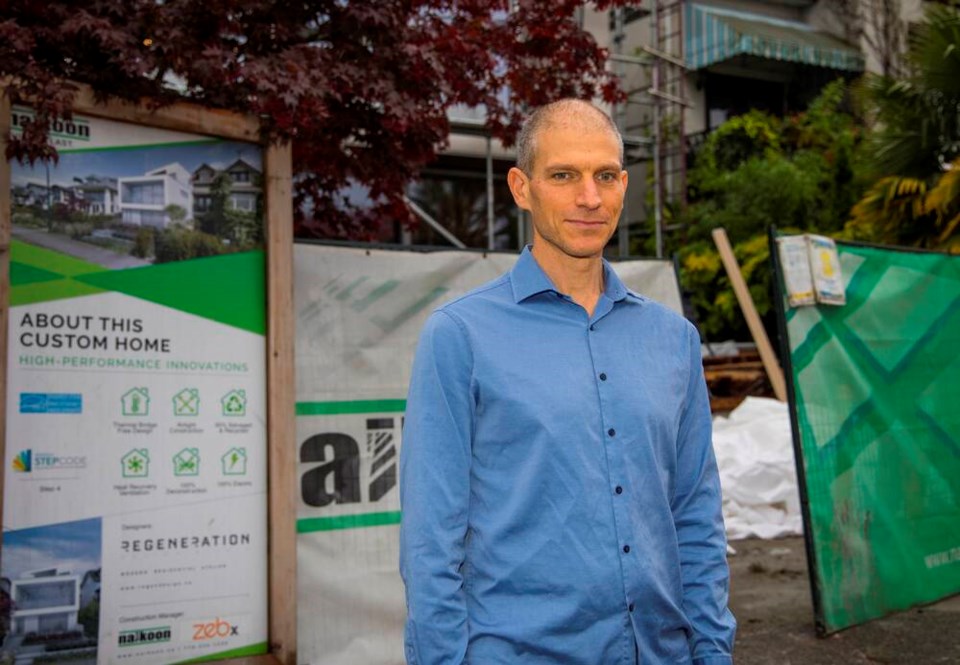A provincial affordable housing program that was supposed to provide taxpayer-subsidized units with rent caps is undergoing a review to determine why some units are listed for hundreds more a month and whether some ended up on Airbnb.
It’s led the official Opposition to brand the B.C. NDP’s HousingHub program a “massive housing flub” and a clear example, they say, of B.C. Housing’s mismanagement of affordable housing programs.
The B.C. Liberals listed six buildings across the province in Merritt, West Kelowna, North Vancouver, Nanaimo, Maple Ridge and Victoria where — despite developers receiving low-interest loans from the province — the units are now renting for considerably higher than the promised rent cap.
For example, Olympic Villas in Merritt — which in 2020 received $16.6 million in low-interest financing from the government in exchange for setting aside 45 of the 75 units for below-market rent — has multiple units listed on Airbnb and Expedia for up to $250 a night and units renting for up to $2,380 amonth.
That’s well above the $1,650 a month for a three-bedroom unit in that building guaranteed by David Eby, then the attorney general and housing minister, in 2021.
“Affordability in these units is ensured for middle income households in Merritt for a decade at least,” Eby wrote in a 2021 letter to B.C. Liberal MLA Peter Milobar explaining the HousingHub program.
“When you see the Airbnbs and when you see the rents that are being charged, none of it lines up with the intent and the spirit of what the low-interest loan was supposed to be,” Milobar said Thursday.
While the Ministry of Housing has admitted some units are being rented at rates above the caps, it’s unclear whether any of the units listed on Airbnb are among the 45 set aside as affordable.
Eby, addressing the issue during question period this week, said the government subsidized 45 of 75 units through the HousingHub and “it’s quite possible for the remaining 30 units that the rents are up.”
HousingHub, a division of B.C. Housing, was established by the NDP government in 2018 and provides low-interest loans to developers to build housing for middle-income families with a household income of less than $99,000 per year. The loans are repaid once construction is complete.
Housing Minister Ravi Kahlon told reporters all properties funded by B.C. Housing have a covenant that states they’re not allowed to be used for short-term rentals like Airbnb.
“So if there’s someone doing that they’re breaking the law,” said Kahlon. He’s asked B.C. Housing to look into any property owners who are flouting the rules.
Also during question period, Eby said he knows renters are frustrated by seeing “badly needed rental housing” listed on short-term rental websites, which is why the government is working with the Union of B.C. Municipalities to introduce legislation to further regulate the industry. He did not specify a timeline for when that legislation might be introduced.
In an unattributed statement, the Ministry of Housing acknowledged some units are renting for more than the agreed-upon caps.
This is because developers experienced “cost escalations during construction” relating to factors including pandemic-related delays, global supply chain challenges, labour shortages and disruptions related to extreme weather events including fires and flooding in Merritt.
The rents, the ministry said, are still “lower than they would be if the project had been solely privately financed and they remain at or below market rents for the area.”
The program’s low-interest loans have financed 3,339 units and another 3,237 which are under construction.
Tom Davidoff, executive director of the Centre for Urban Economics and Real Estate at the University of B.C.’s Sauder School of Business, said the problems with the HousingHub point to the need for a dramatic rethink of the way the B.C. government delivers affordable housing.
Instead of fruitlessly trying to control the real estate market and provide a limited number of truly affordable units to lower- and middle-income British Columbians, Davidoff said, the government should give developers free rein to build market-rate units in return for tax dollars. The government can then use that money to give out rental rebates to those who need it.
“Trying to tell the market who is going to get what unit is a fraught exercise,” Davidoff said.
The B.C. NDP promised a $400 renters rebate in the 2017 election, on which they not yet delivered.
Davidoff said the province is at risk of making the same mistakes through the B.C. Builds program, which Eby has touted as a complete overhaul of the way the province builds housing for the middle class. Eby has tapped former Victoria mayor Lisa Helps to serve as his housing adviser and work with Kahlon to roll out the B.C. Builds program ahead of legislation coming in the fall.



